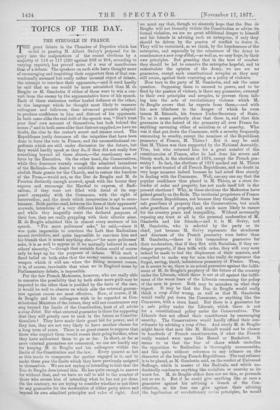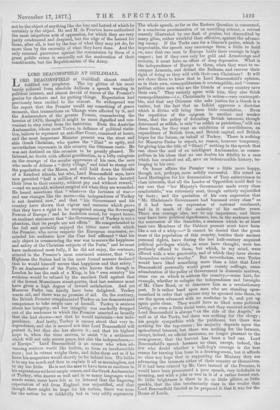TOPICS OF THE DAY.
THE STRUGGLE IN FRANCE. THE great debate in the Chamber of Deputies which has ended in passing M. Albert Grevy's proposal for in- quiry into the malpractices of the recent elections by a majority of 116 or 117 (320 against 203 or 204, according to varying reports), has proved more of a war of manifestoes than of a debate. The speakers on each side have thought more of encouraging and inspiriting their supporters than of that con- ventionally assumed but really rather unusual object of debate, the attempt to convince their opponents,—and it need hardly be said that no one would be more astonished than M. de Broglie or M. Gambetta if either of them were to win a con- vert from the enemy by the argumentative force of his speech. Each of these statesmen rather hurled defiance at the other, in the language which he thought most likely to reassure colleagues and followers, than advanced grounds adapted to produce confidence in him and distrust of his opponents. In both cases alike the real drift of the speech was, " Don't trust your foes' own account of themselves, but look behind the scenes ;" and in both cases alike that distrust supplied,we have no doubt, the clue to the orator's secret and sincere creed. The Republicans justly denounce all the iniquities that have been done to force the vote in France, and the unconstitutional ex- pedients which are still under discussion for the future, but they would hardly speak as they do, if they did not really fear something beyond all these abuses,—the reactionary use of force by the Executive. On the other hand, the Conservatives, while they denounce warmly enough the admitted intentions of the Radicals—the desire to establish secular education, to abolish State grants for the Church, and to restore the freedom of the Press,—would not, as the Duo de Broglie and M. de Fourtou distinctly enough avowed, speak with the horror they express and encourage the Marshal to express, of Radi- ealism, if they were not filled with dread of its sup- posed sympathy with the Commune, with the right of insurrection, and the deeds which insurrection is apt to coun- tenance. Both parties read, between the lines of their opponents' avowals, intentions of a very different kind to those avowed, and while they languidly resist the declared purposes of their foes, they are really grappling with their ulterior aims. M. de Broglie admitted this in almost every sentence of his speech. " For . mere politeness' sake," he said,—since it was quite impossible to convince the Left that Radicalism meant revolution, and quite impossible to convince him and his friends that it meant anything else,—" for mere politeness' sake, it is as well to appear as if we mutually believed in each others' sincerity,"—though that amiable fiction could of course only be kept up for the purposes of debate. With such a fixed belief on both sides that the enemy carries a concealed weapon which it will use when the fitting moment comes, it is, of course, inevitable that what we in England mean by Parliamentary debate, is impossible. For the few French Moderates, however, who are really able to conceive the possibility that by both sides more guilt may be imputed to the other than is justified by the facts of the case, it would be well to observe on which side the external guaran- tees against excess are most effective. Now, of course, if M. de Broglie and his colleagues wish to be regarded as Con- stitutional Ministers of the future, they will not countenance any step beyond the limits of the Constitution, least of all advise a coup d'ertat. But what external guarantee is there for supposing that they will greatly care to rank in the future as Constitu- tionalists ? They have made their great bid for power, and if they lose, they are not very likely to have another chance for a long term of years. There is no great reason to suppose that those who support them would resent their going further, when they have authorised them to go so far. In short, so far as mere external guarantees are concerned, we can see hardly any for keeping M. de Broglie and his colleagues within the limits of the Constitution and the law. Every quarrel as hot as this tends to exasperate the parties engaged in it, and to make them pass the limits which they have previously assigned to themselves. We are not saying or intending to hint that the Due de Broglie does intend this. He has quite enough to answer for without that, and we have no call to add to the number of those who accuse him of intending what he has not yet done. On the contrary, we are trying to consider whether or not there be any guarantee for the moderation of either party abOve and beyond its own admitted principles and rules of right. And we must say that, though we sincerely hope that the Duo de Broglie will not formally violate the Constitution or advise its• formal violation, we see no great additional danger to himself and his friends in advising such an enterprise, if only they should be driven by the passion of conflict to desire it. They will be restrained, as we think, by the hopelessness of the enterprise, and especially by the reluctance of the Army to countenance a new coup d'itat,—as well as, we may hope, by their own principles. But granting that in the heat of combat they should be led to conceive the enterprise hopeful, and to miscalculate the opinion of the Army, we can see no guarantee, except such constitutional scruples as they may still retain, against their venturing on a policy of violence.
Now turn to the party of M. Gambetta, and ask the same question. Supposing them to succeed to power, and to be fired by the passion of victory, is there any guarantee, external to their own principles and scruples, to prevent them fall- ing into the acts of revolutionary violence which M. de Broglie avows that he expects from them,—and with his new blindness to the danger of which he even taunts M. Renault, his former Under-Secretary of State. To us it seems perfectly clear that there is, and that this guarantee is the hatred of the peasantry all over France for anything savouring either of socialism or of anarchy. Who was it that put down the Commune, with a severity frequently amounting to cruelty, except the nominee of the Republican. peasantry of France, M. Thiers ? But it may be said that M. Thiers was then supported by the National Assembly. True, but who returned him for a great number of the constituencies of France, after he had done his severe and bloody work, in the elections of 1876, except the French pea- santry V In fact, the elections of 1876 marked out M. Thiers as the most trusted of all French Republicans, and no doubt in very large measure indeed because he had acted thus sternly in dealing with the Commune. Well, can any one say that the popular confidence thus placed in M. Thiers, as a stern de- fender of order and property, has not made itself felt in the present elections ? Why, in these elections the Moderates have gained greatly on the Reds. The territorial proprietors of France have chosen Republicans, not because they thought them less safe guardians of property than the Conservatives, but much safer, guardians of property, and much more likely to ensure for the country peace and tranquillity. Without necessarily reposing any trust at all in the personal moderation of AL Gambetta and his friends,--and it is M. Gravy, not M. Gambetta, who is selected by the party as its chief, just because M. Grevy represents the steadiness and dourness of the French peasantry even better than M. Gambetta,—there is this tremendous guarantee for• their moderation, that if they flirt with Socialism, if they en- danger property, if they trifle with order, they will very soon indeed be made to feel the displeasure of their masters, and compelled to make way for men who really do represent the frugal, saving, timid, industrious peasantry of France. Thus, as it seems to us, there is an actual guarantee against the fulfil- ment of M. de Broglie's prophecy of the future of the country under the Liberals, which there is not at all against the fulfil- ment of the worst fears of the Liberals concerning the policy of the men in power. Both may be mistaken in what they expect. It may be that the Due de Broglie would really think a coup (Mae wrong, as well as that M. Gambetta would really put down the Commune, or anything like the Commune, with a stern hand. But there is a guarantee for a safe policy under the Liberals, which there is not for a constitutional policy under the Conservatives. The Liberals dare not offend their constituents by encouraging anarchy. The Conservatives would hardly offend their con- stituents by advising a coup d'Itat. And surely M. de Broglie might know that men like M. Renault would not be chosen in hundreds of French constituencies, if what the French really wanted were men like Hosed or Rochefort. It seems to us that the fear of chaos which underlies the opposition to Radicalism is 'thoroughly unreasonable, and this quite without reference to any reliance on the character of the leading French Republicans. The real reliance is to be placed, as M. Gambetta said, on the verdict of Universal Suffrage, which is master of the Radicals, and which un- doubtedly condemns anything like socialism or anarchy as its worst foe. M. de Broglie either does not see this, or pretends not to see it. But if he could give anything like as sure a guarantee against his advising a breach of the Con- stitution, as his foes can give against their advising the legalisation of revolutionary social principles, ho would not be the object of anything like the fear and hatred of which he certainly is the object. He and M. de Fourtou have authorised the most iniquitous acts of oppression, for which they are very justly condemned and despised, but the edge of the hatred for them, after all, is lent by the fear of what they may yet do, far more than by the enormity of what they have done. And the only external guarantee against the commission by them of a great public crime is assuredly not the moderation of their constituents, but the Republicanism of the Army.







































 Previous page
Previous page